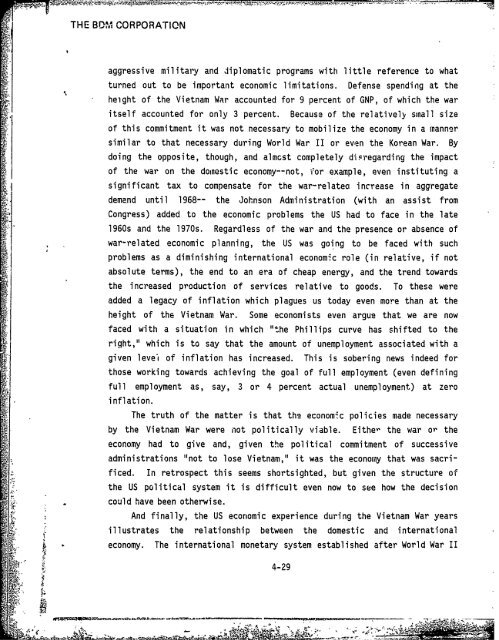policy - The Black Vault
policy - The Black Vault
policy - The Black Vault
Create successful ePaper yourself
Turn your PDF publications into a flip-book with our unique Google optimized e-Paper software.
THE BD,<br />
CORPORATION<br />
F<br />
aggressive military and diplomatic programs with little reference to what<br />
turned out to be important economic limitations. Defense spending at the<br />
height of the Vietnam War accounted for 9 percent of GNP, of which the war<br />
itself accounted for only 3 percent. Because of the relatively small size<br />
of this commitment it was not necessary to mobilize the economy in a manner<br />
similar to that necessary during World War II or even the Korean War.<br />
doing the opposite, though, and almcst completely disregarding the impact<br />
of the war on the domestic economy--not, for example, even instituting a<br />
significant tax to compensate for the war-relatea increase in aggregate<br />
demand until 1968-- the Johnson Administration (with an assist from<br />
Congress) added to the economic problems the US had to face in the late<br />
"1960s and the 1970s. Regardless of the war and the presence or absence of<br />
war-related economic planning, the US was going to be faced with such<br />
problems as a diminishing international economic role (in relative, if not<br />
absolute terms), the end to an era of cheap energy, and the trend towards<br />
the increased production of services relative to goods.<br />
By<br />
To these were<br />
added a legacy of inflation which plagues us today even more than at the<br />
height of the Vietnam War.<br />
Some economists even argue that we are now<br />
faced with a situation in which "the Phillips curve has shifted to the<br />
right," which is to say that the amount of unemployment associated with a<br />
given leve' of inflation has increased. This is sobering news indeed for<br />
those working towards achieving the goal of full employment (even defining<br />
full employment as, say, 3 or 4 percent actual unemployment) at zero<br />
inflation.<br />
<strong>The</strong> truth of the matter is that the economic policies made necessary<br />
by the Vietnam War were not politically viable. Either the war or the<br />
economy had to give and, given the political commitment of successive<br />
administrations "not to lose Vietnam," it was the economy that was sacrificed.<br />
In retrospect this seems shortsighted, but given the structure of<br />
the US political system it is difficult even now to see how the decision<br />
could have been otherwise.<br />
7 !And finally, the US economic experience during the Vietnam War years<br />
illustrates the relationship between the domestic and international<br />
K economy. <strong>The</strong> international monetary system established after World War II<br />
4-29<br />
-F1 80'
















